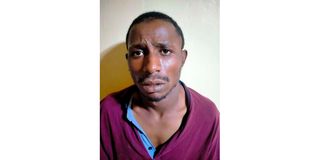Premium
Questions linger over surge in crime as crackdown continues

From left: Vincent Ndiritu, Kelvin Maina and Daniel Mwangi after their arrest over a spate of robberies along Thika Road.
As the dust settles on what has been a few weeks of mayhem in Nairobi and some parts of northern Kenya due to a spike in muggings and banditry, questions are being asked on what could have gone wrong and what effect this surge in crime will have in the long run.
With the endless cash supply, courtesy of politicians, over the past two years of political campaigns—which masked how bad the economy was, including the high level of unemployment—having dried up, it is not difficult to see why crime has shot up.

Recently, police said they had a breakthrough in investigations over the stabbing to death of Keegan Githua after the arrest of suspects, including Dennis Mburu Kimani and Devone Mboya Odero.
Other suspected criminals arrested are John Mutiso alias Katitu, who is alleged to be the ringleader of a gang targeting M-Pesa shops, and three people thought to be among those behind robberies along Thika Road — Vincent Ndiritu, Kelvin Maina and Daniel Mwangi.
Since Tuesday, dozens of other suspected criminals have been arrested. They include a 15-year-old boy suspected of being part of a gang that has been robbing people in Nairobi’s South C, three men accused of terrorising people along Thika Road and alleged to have stabbed a KCA University student and four men believed to have stabbed to death a Strathmore University student at Ridgeways.

John Mutiso 'Katitu' -A suspected robber in Nairobi.
Also arrested are six men suspected of robbing the residents of Kasarani. Three others were separately rescued by the police from a mob that was baying for their blood at Globe Cinema roundabout, Kilimani and on Tom Mboya Street.
New Nairobi police boss Adamson Bungei yesterday told Sunday Nation that at least1,000 suspects, who they believe are behind the surge in crime, have been arrested since the war to restore order in the city started.
“We are doing well. The officers are out there on the streets and they all have the areas they are supposed to operate in and their specific mandates,” he said. “Nairobians should be sure of their security and should not fear to go about their businesses.”
The areas listed as hotspots by the National Police Service include Globe Cinema, Kipande Road, Thika Highway, Drive-Inn, River Road, Archives, Kirinyaga Road, Fig Tree, ABC Place, and Kangemi. Some social media posts in the last couple of weeks have claimed that several cases of stabbings are received at the Kenyatta National Hospital daily.
Necessary force
Although it is still too early to say the level of crime has gone down, with the government maintaining that it is on top of the situation, the fact that it prompted President Ruto to allow the police to use force if necessary shows how bad the situation has become.
After weeks of rhetoric that the government will not tolerate extrajudicial killings, the state finally issued a warning to criminals that it is prepared to use force if that is what it will take to bring things back to normal.
“If any officer is in danger of criminals, they must use their firearms to deal with criminals. Do not wait until our officers are killed by officers,” President Ruto said in a clip that was released from State House about a meeting with police commanders on Wednesday.
“We have given you the instruments; you have the backing of the law to make sure we deal with criminals firmly, decisively and conclusively in accordance with the law,” he added.
Police commanders are said to have expressed concern to the President about the fear of victimisation in the wake of an onslaught by the government against officers for carrying out orders and being used for political purposes during the Jubilee administration.
To make matters worse, foreign missions aware of the situation, especially from the sustained media coverage, have been piling pressure on the government to give them assurance on the security levels as the December festive season fast approaches.
So far, no global power has issued a security alert to the increased levels of insecurity in Nairobi. The United States, in its routine security alert issued last month, maintained Kenya on Level 2, warning its citizens to “exercise increased caution”.

Dennis Mburu Kimani-A suspected robber in Nairobi.
“Violent crime, such as armed carjacking, mugging, home invasion, and kidnapping, can occur at any time. Local police are willing but often lack the capability to respond effectively to serious criminal incidents and terrorist attacks. Emergency medical and fire service is also limited,” warned the US.
The US has classified threat levels in any country into four categories, with Level 4 being the worst. Lagos, the capital of Nigeria, for example, is classified as a Level 3, with American citizens being warned to reconsider travel to Africa’s largest economy, something that greatly impacts foreign direct investment there.
Therefore, an increase in security threat levels by any of the global powers on Kenya will have ripple effects on the economy, especially with regard to tourism and foreign direct investments. Those in the know say this was partly why the government decided to fight the increased insecurity by ruthlessly dealing with criminals by unleashing General Service Unit officers to patrol the city.
During Wednesday’s meeting, the President reiterated to security chiefs that the government will not condone kidnappings and enforced disappearances of suspects. He, however, gave them his full backing to do anything within the law to deal with armed gangs, including shooting anyone who is armed in anyway, including with a knife or machete.
Measures
The strategies employed in the crackdown include reinvigoration of community policing, reduced working hours for the police to 12 per shift, officers wearing uniform as so long as they are on duty and the reintroduction of specialised police units.
The new units are, however, temporary and will be disbanded once crime levels are brought down. They will work directly under the supervision of the sub-county police commanders, who have been ordered to report all cases of interest, map out hotspots and use a multi-agency approach to the reinvigorated fight.
The multi-agency approach, which was introduced after the 2013 Westgate terror attack, involves the coordinated sharing of intelligence among agencies in the security sector. At the local level, a team was chaired by the sub-county commissioner, with members drawn from the National Police, Administration Police and the Directorate of Criminal Investigations.
This approach, which was hugely successful in the reduction of terror, appears to have been dropped by the Kenya Kwanza administration immediately after taking over power, a move blamed for the spike in crime.





